Are you curious about whether recycled plastic is truly eco-friendly? Look no further! This article dives deep into the environmental impact of recycling plastic, the process involved, and the benefits of using recycled plastic products. We’ll also compare recycled plastic to virgin plastic and explore the challenges faced in recycling this material. Stay tuned for insights on innovations in recycled plastic technology, consumer awareness, government initiatives, and sustainable solutions for reducing plastic waste. Get ready to uncover the truth about recycled plastic’s ecological footprint!
The Environmental Impact of Recycled Plastic
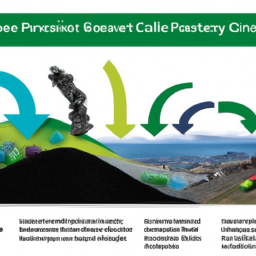
Recycled plastic has a lower environmental impact compared to virgin plastic. When it comes to the impact of plastic pollution, using recycled plastic can make a significant difference. By reusing and repurposing plastic waste, we reduce the need for new plastic production, which in turn conserves energy and resources.
According to studies conducted by environmental organizations, businesses play a crucial role in promoting plastic recycling. Companies can implement recycling programs that encourage employees and customers to properly dispose of their used plastics. These initiatives not only help reduce the amount of plastic waste ending up in landfills or oceans but also create awareness about the importance of recycling.
In addition, businesses can take steps towards using more recycled plastics in their products and packaging materials. This not only reduces the demand for virgin plastics but also helps close the loop on the plastic supply chain. By incorporating recycled plastics into their operations, businesses contribute towards creating a circular economy where waste is minimized and resources are conserved.
Overall, choosing recycled plastic over virgin plastic is an effective way to mitigate the environmental impact of plastic pollution. With businesses taking an active role in promoting recycling and utilizing recycled plastics, we can work together towards a more sustainable future.
The Process of Recycling Plastic
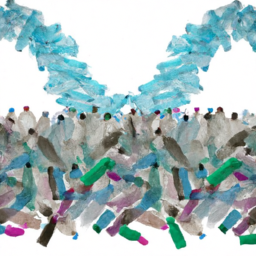
When you reuse plastic, it goes through a process that transforms it into a new material. This recycling process is crucial in addressing the issue of plastic pollution and reducing the demand for virgin materials. Plastic recycling starts with collection and sorting, where different types of plastics are separated based on their resin codes. Once sorted, the plastics are cleaned to remove any contaminants such as labels or food residue. The next step involves shredding or granulating the plastic into small pieces, which are then melted and molded into pellets or flakes. These pellets can be used as raw materials for manufacturing new products.
However, the effectiveness of plastic recycling heavily relies on the availability and efficiency of recycling infrastructure. Inadequate infrastructure can hinder proper collection and sorting processes, leading to low recycling rates. It is essential for communities and governments to invest in robust recycling systems that include convenient drop-off locations, curbside collection programs, and advanced sorting technologies.
Benefits of Using Recycled Plastic Products
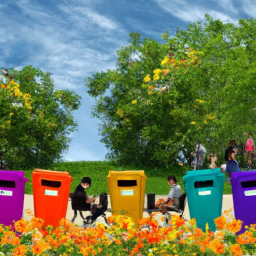
You can contribute to a more sustainable future by choosing products made from reused materials. When it comes to plastic, opting for recycled plastic products offers numerous advantages. First and foremost, using recycled plastic reduces the demand for virgin plastic production. The production of virgin plastic requires extracting fossil fuels and releasing significant amounts of greenhouse gases into the atmosphere. By using recycled plastics, you are helping to conserve natural resources and reduce carbon emissions.
In addition to being environmentally friendly, recycled plastic products also offer practicality. Contrary to popular belief, these products are just as durable and reliable as those made from virgin plastics. They undergo rigorous testing and meet the same quality standards. Moreover, recycling plastic waste helps alleviate the growing problem of landfill overcrowding.
Recycled plastic can be transformed into a wide range of products such as furniture, packaging materials, construction materials, and even clothing fibers. This versatility showcases its potential in various industries.
Choosing recycled plastic products not only benefits the environment but also supports businesses that prioritize sustainability. By making this conscious choice in your purchasing decisions, you are actively contributing to a more sustainable future while enjoying the practicality that recycled plastics offer.
Comparing Recycled Plastic to Virgin Plastic
Using recycled plastic products is an effective way to reduce the demand for virgin plastic production. When comparing recycled plastic to virgin plastic, there are several key economic implications and considerations for long-term sustainability.
Firstly, from an economic standpoint, using recycled plastic can lead to cost savings. The process of producing virgin plastic requires extracting raw materials, refining them, and manufacturing new products. This entire process incurs significant expenses. On the other hand, recycling plastic reduces the need for these costly operations by utilizing existing materials. By reducing production costs, using recycled plastic products can have positive economic impacts on businesses and consumers alike.
Furthermore, incorporating recycled plastics into various industries promotes long-term sustainability. Virgin plastics contribute to environmental degradation through greenhouse gas emissions and pollution during their production process. In contrast, using recycled plastics helps divert waste from landfills and decreases reliance on fossil fuels used in creating virgin plastics. This reduction in waste not only benefits the environment but also contributes to a more sustainable future.
Challenges in Recycling Plastic
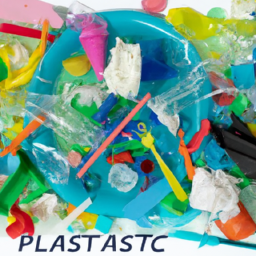
One of the challenges in recycling plastic is the limited infrastructure for collection and processing. The current state of plastic recycling reveals significant issues with contamination in recycled plastic products. Contamination occurs when non-recyclable materials, such as food residue or different types of plastics, mix with the recyclable ones. This hinders the quality and usability of recycled plastic, making it less eco-friendly.
To address this challenge, efforts are being made to improve plastic recycling technology. Advanced sorting techniques, such as optical scanners and infrared sensors, have been developed to efficiently separate different types of plastics for better recycling outcomes. Additionally, research is underway to find effective methods for removing contaminants from recycled plastic.
The goal is to create a closed-loop system where plastic waste can be continually reused without compromising its quality or environmental impact. By enhancing the infrastructure for collection and processing while implementing innovative technologies, we can significantly reduce contamination levels and enhance the overall sustainability of recycled plastics.
It is crucial that stakeholders across industries collaborate in investing resources towards improving recycling infrastructure and technology. Only through these collective efforts can we overcome the challenges associated with recycling plastic and move towards a more sustainable future.
Innovations in Recycled Plastic Technology
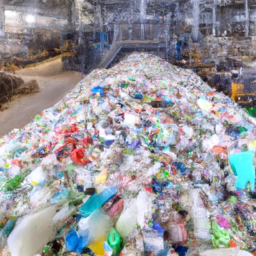
To enhance the quality of recycled plastic, advancements in technology have led to the development of innovative sorting techniques and contaminant removal methods. These innovations are crucial for improving the overall efficiency and effectiveness of recycling processes. One exciting aspect is the future prospects of recycled plastic technology. With ongoing research and development, scientists are continuously discovering new ways to enhance the recycling process and create even higher-quality recycled plastic materials.
In addition to improved sorting techniques and contaminant removal methods, there are also innovative uses for recycled plastic materials. For example, recycled plastic can be used in various industries such as construction, automotive, packaging, and even fashion. This not only reduces the demand for virgin plastics but also promotes a more sustainable approach to manufacturing.
The future outlook for recycled plastic technology is promising. As more investments are made in research and development, we can expect further advancements that will make recycling processes more efficient and cost-effective. This will lead to an increase in the production of high-quality recycled plastic materials that can be utilized across a wide range of industries.
Overall, advancements in technology have paved the way for exciting developments in the field of recycled plastic technology. The future holds great potential for creating innovative solutions that address environmental concerns while simultaneously providing us with sustainable alternatives to traditional plastics.
Consumer Awareness and Education on Recycled Plastic
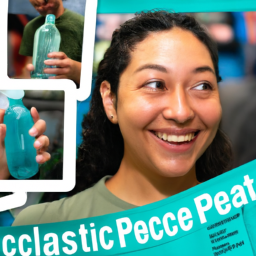
Did you know that being aware of the benefits of recycling can empower you to make more informed choices about your plastic consumption? Consumer behavior plays a crucial role in the transition towards a circular economy, where materials are reused and recycled instead of being disposed of. By understanding the environmental impact of plastic waste and the benefits of recycling, consumers can actively contribute to reducing their carbon footprint.
When it comes to consumer behavior, education on recycled plastic is essential. With proper awareness, individuals can make conscious decisions about purchasing products made from recycled plastics or avoiding single-use plastics altogether. Understanding that recycled plastic reduces the need for new raw materials extraction and energy consumption can motivate consumers to opt for eco-friendly alternatives.
The circular economy model encourages responsible production, consumption, and disposal practices. By choosing products made from recycled plastics, consumers support this sustainable approach and help create a market demand for such products. This shift in consumer preference ultimately drives innovation in recycling technologies and promotes the development of more environmentally friendly packaging solutions.
Government Policies and Initiatives for Recycling Plastic
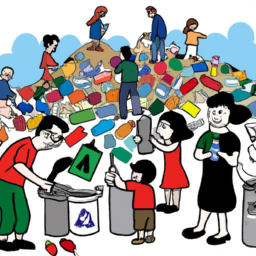
Government policies and initiatives play a crucial role in promoting the use of recycled plastics and driving sustainable practices. Through government regulations, countries are implementing measures to encourage recycling and reduce plastic waste. One approach gaining momentum is the circular economy, which aims to keep materials in use for as long as possible, extracting their maximum value before disposing of them. Many governments have recognized the importance of adopting a circular economy approach to tackle the challenges posed by plastic waste.
For instance, some countries have introduced legislation that mandates the use of recycled content in plastic products. This not only creates a demand for recycled plastics but also encourages manufacturers to incorporate more recycled materials into their production processes. Additionally, governments are incentivizing businesses and consumers through tax incentives or subsidies to choose products made from recycled plastics.
Furthermore, governments are investing in infrastructure and facilities for effective collection, sorting, and processing of recyclable materials. By improving recycling infrastructure, authorities can ensure that more plastics are diverted from landfills and instead make their way back into the production cycle.
Sustainable Solutions for Reducing Plastic Waste
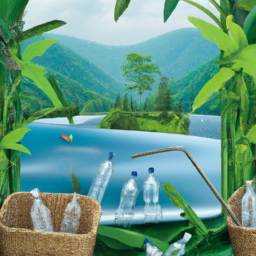
One way to address the issue of plastic waste is by promoting sustainable practices and finding innovative solutions. In recent years, there has been a growing interest in alternative materials that can replace traditional plastics. These materials are often biodegradable or compostable, which means they break down naturally and do not contribute to long-term pollution. Additionally, the concept of a circular economy has gained traction as a means to reduce plastic waste. A circular economy aims to minimize waste by keeping resources in use for as long as possible through recycling, reusing, and repurposing.
Many companies are now exploring the use of alternative materials such as plant-based plastics, bio-composites, and even edible packaging made from seaweed or other natural sources. These materials offer similar functionalities to conventional plastics but with lower environmental impacts.
Furthermore, embracing a circular economy approach helps close the loop on plastic production and consumption. By implementing recycling programs and encouraging consumers to recycle their plastic waste properly, we can reduce the amount of virgin plastic needed for new products.
Promoting sustainable practices and adopting alternative materials along with a circular economy approach are crucial steps towards addressing the issue of plastic waste. These strategies not only help mitigate environmental damage but also pave the way for a more sustainable future where our reliance on single-use plastics is significantly reduced.
Frequently Asked Questions
How Long Does It Take for Plastic to Decompose in a Landfill?
Plastic decomposition timeline varies depending on the type of plastic. Some plastics can take hundreds of years to decompose in a landfill, while others may never fully break down. This extended timeline has significant environmental impacts, as it leads to the accumulation of plastic waste in landfills and ecosystems. Plastic pollution poses threats to wildlife, marine life, and human health. Finding sustainable solutions like recycling is crucial to mitigate these negative effects.
Can All Types of Plastic Be Recycled?
When considering the topic of recycled plastic, it’s important to explore the manufacturing process and the benefits of recycling. Recycled plastic is created by collecting waste plastic, processing it into new materials, and then using those materials to manufacture new products. This practice helps reduce the amount of plastic waste in landfills and conserves resources. Additionally, recycling plastic reduces energy consumption and greenhouse gas emissions compared to producing new plastic from raw materials.
What Are the Most Common Products Made From Recycled Plastic?
When it comes to the benefits of using recycled plastic in manufacturing, there are several common products that can be made. These include things like plastic bottles, containers, bags, and even clothing. By recycling plastic, we can reduce the need for new raw materials, conserve energy, and decrease greenhouse gas emissions. This has a positive impact on the environment by reducing waste and pollution. So when considering the question of whether recycled plastic is eco-friendly, it’s clear that it offers many advantages.
Are Recycled Plastic Products Safe for Food and Beverage Consumption?
Recycled plastic alternatives can be a solution to reduce waste and conserve resources. However, when it comes to using recycled plastic products for food and beverage consumption, health concerns arise. It is important to consider the potential leaching of chemicals from the plastic into the food or drink. Studies have shown that certain types of recycled plastics may contain harmful substances such as phthalates or BPA. Therefore, it is recommended to choose food-grade plastics or other eco-friendly materials for safer consumption options.
How Can Individuals Contribute to the Recycling of Plastic?
To contribute to the recycling of plastic, you can start by reducing plastic waste in your daily life. Opt for reusable bags, bottles, and containers instead of single-use ones. Support companies that promote sustainable packaging and use recycled materials. Educate yourself about proper recycling practices and ensure that you separate your recyclables correctly. By taking these steps, you can help lessen the environmental impact of plastic production and disposal.
Conclusion
In conclusion, using recycled plastic is an eco-friendly choice due to its positive environmental impact. The process of recycling plastic reduces the need for new plastic production, which in turn conserves energy and reduces greenhouse gas emissions. Additionally, using recycled plastic products helps to mitigate plastic waste and contributes to a circular economy. However, challenges in recycling plastic still exist, and ongoing innovations in technology are necessary to address these issues. Consumer awareness and education, as well as government policies and initiatives, play crucial roles in promoting sustainable solutions for reducing plastic waste.